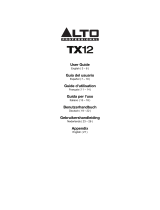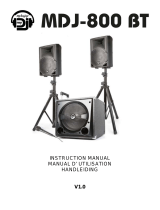
3
Important Safety Precautions
Please note: Alto Professional and inMusic are not responsible for the use of its products or the
misuse of this information for any purpose. Alto Professional and inMusic are not responsible for the
misuse of its products caused by avoiding compliance with inspection and maintenance procedures.
Please also refer to the included safety and warranty manual for more information.
Caution: To reduce the risk of electric shock, do not connect a TX2 Series loudspeaker to a
power outlet while the grille is removed.
Stand-Mounting
Important: Do not suspend a TX2 Series loudspeaker. It is not designed for suspended applications. We
recommend our Truesonic (TS) Series or Black Series loudspeakers for suspended applications instead.
• Always install loudspeakers in accordance with applicable electrical and building codes.
• Install the loudspeaker according to its maximum weight. Check the specifications of your stand
or pole to ensure it can support the loudspeaker’s weight. Also, observe all safety precautions
specified by the manufacturer.
• Do not mount multiple loudspeakers on the same stand or pole.
• Always verify that the stand or pole is on a flat, level, and stable surface. Also, fully extend the
legs of tripod-style stands, and ensure its legs do not present a trip hazard.
• Inspect the stand (or pole and associated hardware) before each use and do not use equipment
with worn, damaged, or missing parts.
• Always be cautious in windy, outdoor conditions. You may need to place additional weight (e.g.,
sandbags) on stand’s base to improve stability. Do not attach banners or similar items to any part
of a loudspeaker system. Such attachments could act as a sail and topple the system.
• Unless you are confident that you can handle the loudspeaker’s weight, ask another person to
help you lift it onto the stand or pole.
• Make sure your cables are out of the way of performers, production crew, and audience so they
will not trip over them, pulling the loudspeaker off the stand or pole.
Sound Level
Permanent hearing loss may be caused by
exposure to extremely high noise levels. The U.S.
Occupational Safety and Health Administration
(OSHA) has specified permissible exposures to
certain noise levels. According to OSHA,
exposure to high sound pressure levels (SPL) in
excess of these limits may result in hearing loss.
When using equipment capable of generating
high SPL, use hearing protection while such
equipment is under operation.
Hours per da
SPL (dB) Example
8 90 Small gig
6 92 Train
4 95 Subway train
3 97 High-level desktop monitors
2 100 Classical music concert
1.5 102 Riveting machine
1 105 Machine factory
0.5 110 Airport
0.25 or less 115 Rock concert















